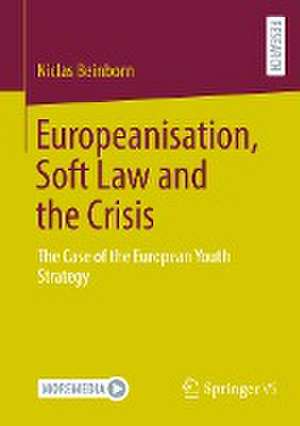Europeanisation, Soft Law and the Crisis: The Case of the European Youth Strategy
Autor Niclas Beinbornen Limba Engleză Paperback – 22 noi 2023
Preț: 521.60 lei
Preț vechi: 613.64 lei
-15% Nou
Puncte Express: 782
Preț estimativ în valută:
99.81€ • 104.69$ • 83.09£
99.81€ • 104.69$ • 83.09£
Carte tipărită la comandă
Livrare economică 01-15 aprilie
Preluare comenzi: 021 569.72.76
Specificații
ISBN-13: 9783658432430
ISBN-10: 3658432438
Pagini: 187
Ilustrații: XIX, 187 p. 10 illus. Textbook for German language market.
Dimensiuni: 148 x 210 mm
Greutate: 0.25 kg
Ediția:1st ed. 2024
Editura: Springer Fachmedien Wiesbaden
Colecția Springer VS
Locul publicării:Wiesbaden, Germany
ISBN-10: 3658432438
Pagini: 187
Ilustrații: XIX, 187 p. 10 illus. Textbook for German language market.
Dimensiuni: 148 x 210 mm
Greutate: 0.25 kg
Ediția:1st ed. 2024
Editura: Springer Fachmedien Wiesbaden
Colecția Springer VS
Locul publicării:Wiesbaden, Germany
Cuprins
Introduction.- (European) youth policy and why research it.- Europeanisation and soft law.- EU Youth Strategy and fsQCA.- Case study analysis.- Conclusions.
Notă biografică
Niclas Beinborn worked as a research associate at the German Research Institute for Public Administration in Speyer. There, he extensively studied child and youth policy in Germany and Europe. As of 2021, he works as a desk officer in the federal administration.
Textul de pe ultima copertă
Influence of “hard” law on national policies still is a central topic in Europeanisation research. One aspect often overlooked is the impact of “soft” law instruments such as the “Open Method of Coordination” (OMC). Through the OMC all member states agree on common goals and exchange “best practices” to improve policy coordination in a certain area without the obligation (how) to design policies. OMC impacts in individual member states have been studied extensively, yet a comparative perspective explaining their variance is lacking. This study by Niclas Beinborn tries to fill this gap by analysing the different impacts of a recent OMC: the European Youth Strategy 2010 (EUYS). His analysis is twofold: in a first step he applies theory-driven fuzzy-set QCA to a novel dataset depicting the variance of national activities around the EUYS. As causalities remain unclear, in a second step he presents an innovative analysis framework encompassing two dimensions – national motivation and relative openness to implement non-binding EU law – to define ideal types of OMC adaptation. Case studies on the EUYS in Germany and Ireland proof the potential of this framework to explain why and how OMCs work (differently).
About the author
Niclas Beinborn worked as a research associate at the German Research Institute for Public Administration in Speyer. There, he extensively studied child and youth policy in Germany and Europe. As of 2021, he works as a desk officer in the federal administration.
